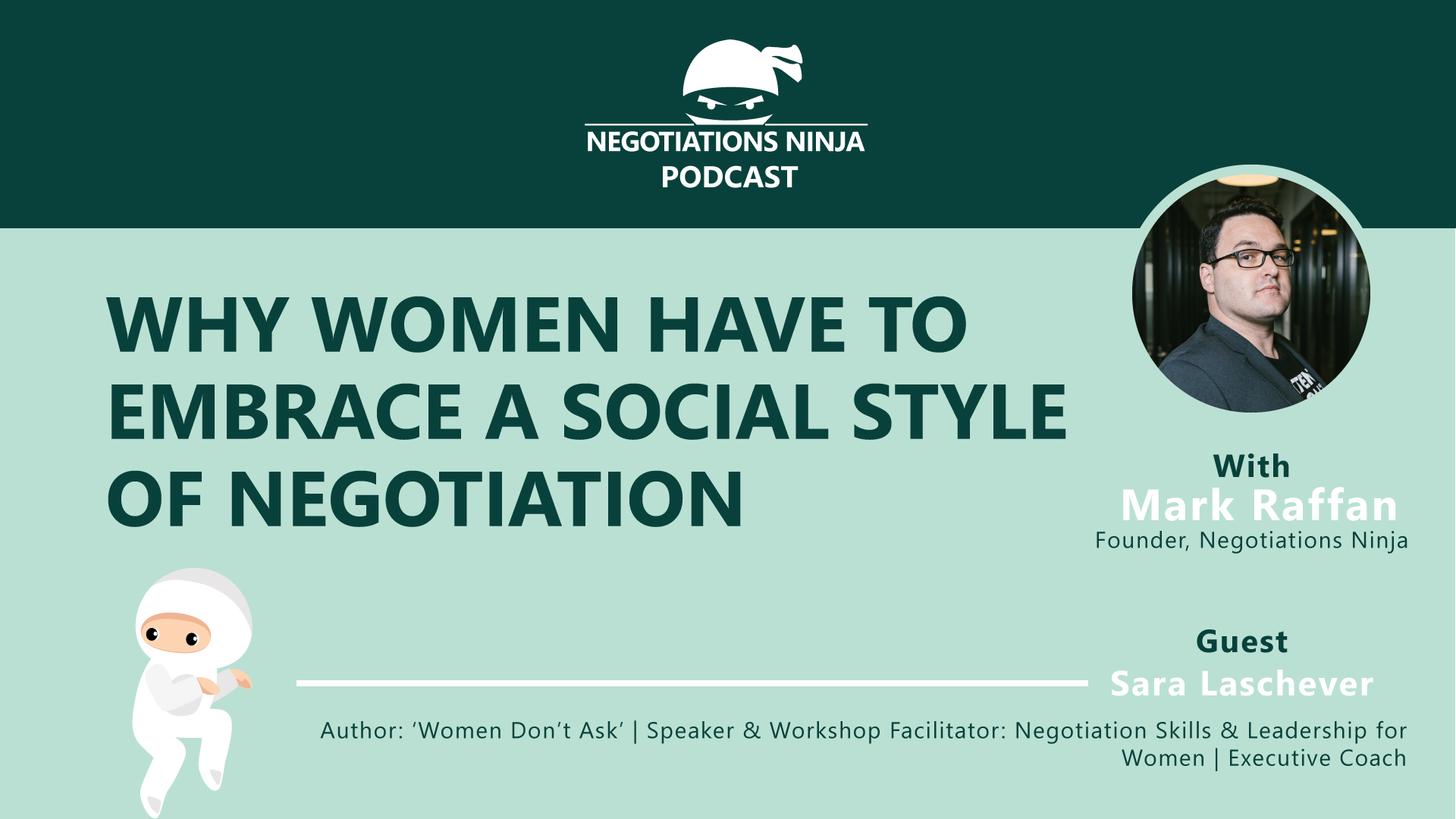Sara Laschever is an authority on the challenges that women face at work. Sara writes about women and work, with a focus on women in negotiation. Why do women struggle to negotiate for themselves? How can they do things differently, feel more comfortable, and be more successful? After writing their first book, “Women Don’t Ask,” Sara and Linda Babcock wrote another book, “Ask for It.” The second book is a how-to of sorts to help women learn to be better negotiators.
But it’s not just a confidence issue; it’s a systemic issue in the workplace. Books like Sara’s are important to help women feel like they aren’t alone—while giving them practical solutions to deal with the issues at hand. In this episode of Negotiations Ninja, we discuss practical ways women can become more effective and successful negotiators. Don’t miss it!
Outline of This Episode
- [1:32] Learn more about Sara Laschever
- [3:49] How to ask for the things you want
- [9:43] Approach a negotiator as an ally
- [12:57] Women excel at collaboration
- [13:51] The difference between value proposition and resume
- [16:58] Roleplaying as part of the preparation process
- [21:42] As cultural norms adapt, will negotiation styles change?
- [24:10] Place an emphasis on preparation and research
- [25:49] Learn how to connect with Sara Laschever
How to ask for the things you want
Sara emphasizes that it’s not necessarily what you ask for but how you ask for it. The research is clear that to be persuasive and influential, women need to be perceived as likable. Men can just be competent and make a good argument, and people hear it. People don’t take in the request the same way when a woman is not smiling. It’s incredibly exasperating and feels like a step backward.
Worrying about whether the other person is having a good time in addition to making a strong argument places an extra burden on women. But Sara recommends viewing it as a tactic or strategy as opposed to a sell-out. The research is clear—it makes a difference.
If a woman is relaxed, makes eye contact, smiles, and is upbeat and cheerful, she will be more successful. It also makes the interaction more pleasant. It’s less likely that the other negotiator will feel threatened and get into a conflict spiral. It’s not a bad tactic for men to embrace either. Coming in guns-blazing isn’t always a great strategy, and people won’t love negotiating with you. It can be damaging to your reputation and isn’t the way to build long-term relationships.
Women have to embrace a social style of negotiation
A group of organizational psychologists wrote a script in which somebody tried to persuade other people to agree with a particular point of view. They hired a man and a woman and videotaped each performing the script in four different ways. They were asked to embrace a dominant style in the first recording. The second was more recessive, where the person leaned back, didn’t make eye contact, and didn’t speak confidently.
The third style was task-oriented, straightforward, and direct. The fourth was a more social style, where the actors made eye contact, smiled, and spoke in a relaxed manner. Everyone that saw the videos rated it by how persuaded they were by the argument. Interestingly, neither the man nor woman were persuasive with the dominant or recessive styles. What won? The man was equally persuasive between the task-oriented and social styles. The woman was found to be the most persuasive when she used the social style.
Embrace roleplaying to improve your negotiation skills
When you think hard, you tend to frown more and look hostile. You may tap your foot and seem impatient. Because of these mannerisms you may not be aware of, Sara encourages women to role-play a negotiation in advance and get feedback from someone they trust. That person can help you hone in on what you’re doing right and what you need to change. It can also help you navigate emotions that will come up in the negotiation so you aren’t surprised by them. You’ll be better prepared for whatever comes your way.
Resources & People Mentioned
- BOOK: Women Don’t Ask
- BOOK: Ask For It
Connect with Sara Laschever
Connect With Mark
- Follow Negotiations Ninja on Twitter: @NegotiationPod
- Connect with Mark on LinkedIn
- Follow Negotiations Ninja on LinkedIn
- Connect on Instagram: @NegotiationPod
- negotiations.ninja




